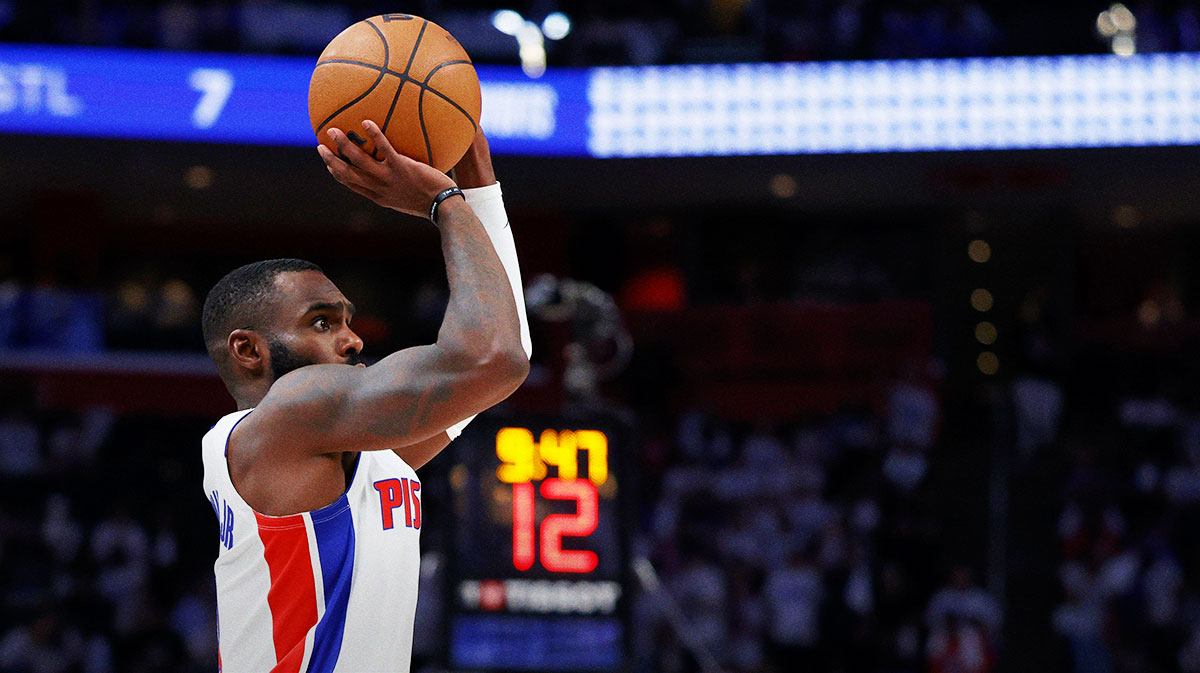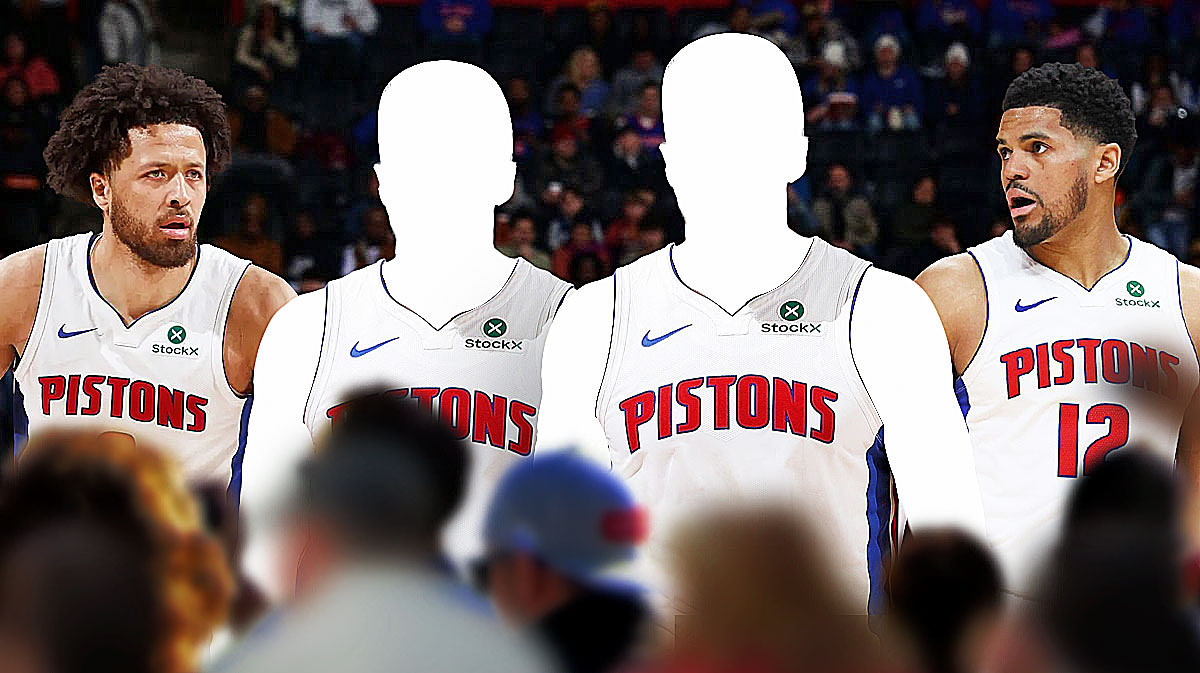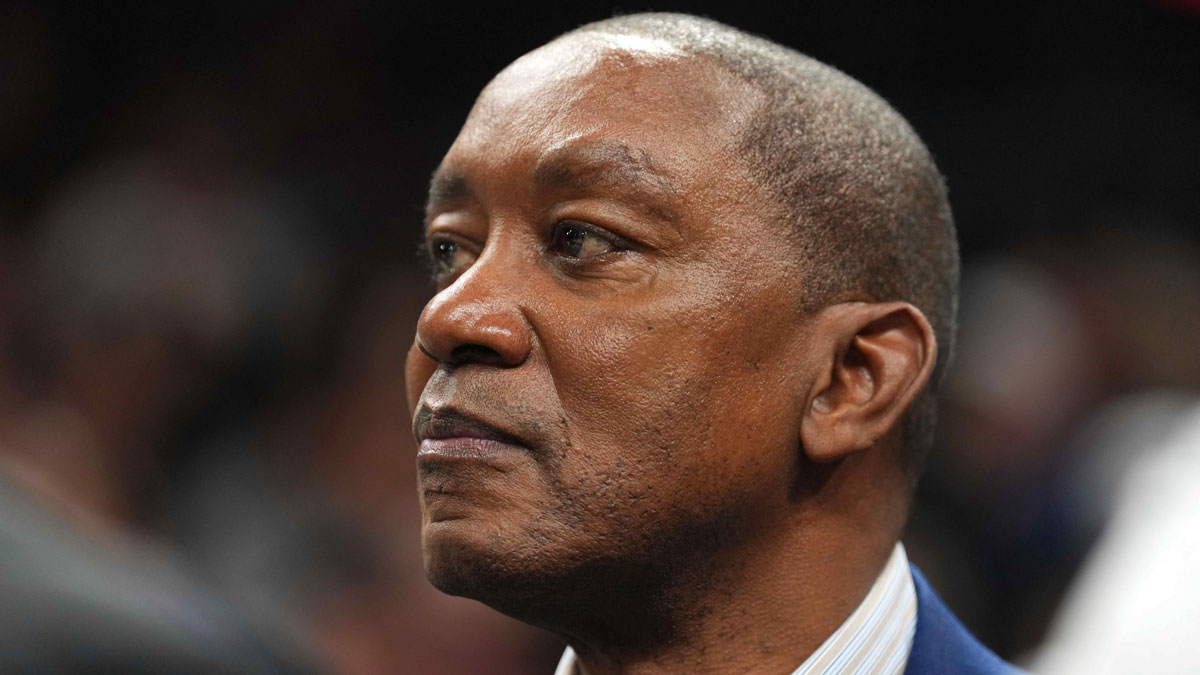Tim Hardaway Jr. was fouled at the end of Game 4 between the New York Knicks and Detroit Pistons on Sunday afternoon. The Pistons knew it, Knicks swingman Josh Hart knew it, and everyone in Little Caesars Arena knew it. Well, everyone except the three people responsible for calling the foul.
With the Knicks leading 94-93, Cade Cunningham pulled up from about 14 feet to try and give his team the lead with seconds left on the clock. Cunningham missed off the front of the rim, resulting in Tobias Harris and Hart battling for the rebound. Bodies hit the floor before the ball trickled to Hardaway in the corner for a contested jumper with under a second left.
There was obvious contact from Hart, who jumped into Hardaway after the veteran shooting guard pump-faked. This was a foul … or at least everyone observing this game thought it was. None of the three officials blew their whistle, resulting in the game coming to an end.
The Knicks won Game 4 in Detroit and took a 3-1 series advantage, but this series has been tainted by a blatant and obvious foul that wasn't called.
To make matters worse, crew chief David Guthrie, who was just a few feet away from where the play at the end of the game happened, came out after the Knicks won and said that his crew made a mistake.
“During live play, it was judged that Josh Hart made a legal defensive play,” Guthrie said in the pool report after the game. “After postgame review, we observed that Hart makes body contact that is more than marginal to Hardaway Jr., and a foul should have been called.”
It is always a good thing to admit when you are wrong. Guthrie did just that, but in sports, officials admitting their wrongdoing doesn't solve anything. In fact, it has only drawn more attention to the fact that this series, which New York leads 3-1 after four games, should probably be even at two games apiece heading back to Madison Square Garden.
Although it's not impossible for Detroit to come back, only 13 of 288 playoff series in the history of the NBA have ever seen a team rattle off three straight wins to come from behind and win after trailing 3-1 in the series. The last team to do so was the Denver Nuggets in 2020, as they came back from down 3-1 in back-to-back series against the Utah Jazz and Denver Nuggets.
This is essentially a death sentence for the Pistons, and any hopes they had of pulling an upset over the Knicks in this first-round series have withered away. Each game has been physical and grueling, resulting in some tight contests coming down to the final few possessions. That was the case in the Knicks' two-point win in Game 3, and that was the case in Game 4 on Sunday.
But the problem is that this play couldn't have been reviewed.
Since no foul was called, this wasn't a play that either team could wind up challenging. The Pistons using their challenge earlier in the game and not having one in this situation is beside the point, as no call being made meant that this play could not be reviewed whatsoever.
Is this really what Adam Silver and the NBA want in terms of playoff games ending in this fashion?
The Pistons are basically eliminated from the playoffs now instead of having a shot at dethroning the Knicks because of one simple call that was somehow missed by three out of over 20,000 people in that arena.
There is always the argument that a team could've done x, y, and z better earlier in the game, and maybe there were missed calls throughout the first 47 minutes of the game. That is 100 percent correct. But the overarching problem here is that this was a one-point game, regardless of what had happened throughout the game.
In this moment, a foul or a no-call changes the entire trajectory of this game and the NBA Playoffs as a whole. Regardless of correct and incorrect calls being made throughout the game, officials and the NBA must ensure their games don't end in controversy.
While it's unfortunate nothing can be done about this call after the fact, perhaps this is a learning moment for the NBA to step in and add some late-game rules for replay review, especially in the postseason.
What happened at end of Pistons-Knicks can't happen…

Missed calls happen all the time in sports. That is why virtually every league has instituted new technology pertaining to replay reviews and cameras to try and minimize mistakes in big moments of big games.
In recent years, the NBA has added Hawk-Eye tracking systems to follow players and ball movement, and even capture insane camera shots nobody else in the arena could get. Not many even knew about the Hawk-Eye system until the NBA had to use it twice to confirm key calls in two separate games.
On Saturday night, the Denver Nuggets won Game 4 of their series against the Los Angeles Clippers as a result of an Aaron Gordon successful dunk at the buzzer. This call stood because of one camera angle the league had, which came from their cameras well above all the patrons.
The NBA Official account posted the video and picture for everyone to see on social media, as it clearly shows Gordon's hand off the ball before the final buzzer sounded.
At the end of Q4 of tonight’s #DENatLAC game, Replay Center officials confirmed the ruling of a good basket by the Nuggets’ Aaron Gordon: pic.twitter.com/BxB4j7TFs8
— NBA Official (@NBAOfficial) April 27, 2025
Then on Sunday, this Hawk-Eye technology made yet another pivotal call that helped decide a game the right way. With 10.1 seconds left between the Los Angeles Lakers and Minnesota Timberwolves, Anthony Edwards appeared to turn the ball over with his team leading by one point.
However, the Wolves challenged the call, and replay review, assisted by Hawk-Eye technology, showed that LeBron James fouled Edwards on the wrist. This contact was deemed worthy of a foul being called, resulting in Minnesota taking a three-point lead and winning Game 4 of this series 116-113 to take a 3-1 lead before Game 5.
After further review, LeBron James was called for a CRUCIAL foul on Anthony Edwards 😳
Ant-Man would make both free throws to go up 3 points and the Wolves would take a WILD Game 4 🍿
Good call or bad call? 🤔pic.twitter.com/qLrQW6L73i
— ClutchPoints (@ClutchPoints) April 27, 2025
Two critical playoff games were decided using replay review correctly, so why couldn't anything happen between the Knicks and Pistons?
The simple answer, besides the officials simply blowing the call, is that there was no stoppage. No foul was called, there was nothing to challenge, and this wasn't a reviewable play because “nothing” happened in terms of what was seen in real-time.
As a result of the questionable no-call and this being a critical moment in the NBA Playoffs, ClutchPoints reached out to a variety of personnel around the league, including some players, for their opinions and thoughts on what occurred.
“Come on now, we all know who they want,” one NBA player told ClutchPoints in a text after the Knicks-Pistons game. “You think they want those young guys in Motown or the team that was supposedly put together to try and beat Boston? Come on, man.”
Others around the league questioned why this isn't a reviewable play, claiming that this is exactly why we have replay review in the first place.
“If you can't go back and look at plays like this, what's the point of allowing teams to challenge plays? The Pistons were robbed, and that's that,” a member of a Western Conference team who was granted anonymity told ClutchPoints.
There is also the idea of sports gambling factoring into this game and the calls and no-calls made. No matter which teams win or lose, hundreds, possibly thousands, of people are making money from consistently gambling on the games, something the NBA has encouraged through their sponsorships with DraftKings, FanDuel, and other gambling services through the years.
Article Continues BelowCertain calls are not being made to influence the outcome of the game in terms of collusion. That is not the case whatsoever, but these missed calls are something the league is going to hear about from a gambling perspective.
“The league must prioritize the integrity of the game, but they also need to acknowledge their role as a proponent of sports gambling,” another league source shared.
At the end of the day, there has to be a better solution here. How can the NBA make sure to get these critical calls right, even if the officials end up missing the play altogether? The easy fix is to implement a new twist to the replay review system that is a mirror image of what happens in the NFL.
What is the solution?

Before the NBA adopted the whole challenge system, teams could ask officials to go to the monitors and review any out-of-bounds play in the final two minutes of a game. The league decided to get rid of this rule because of instances where the last two minutes of games were taking upwards of 20 minutes to complete since every play was being looked at.
Although the league and officials did find some mistakes in terms of calls made when they went to the monitors at the scorer's table, this wasn't the right system. As a result, we now have the challenge system, where coaches can challenge a call at any time and be rewarded an additional challenge if they are correct.
There are also some instances where officials can review goaltending calls made, as well as other small, in-game details like clock adjustments. Fouls, outside of flagrants and technicals, or out-of-bounds calls must be challenged in order for there to be a review.
That is where an adjustment needs to be made to the rules for instances like what happened between the Knicks and Pistons on Sunday afternoon to be avoided. A game cannot be decided by the official making a mistake and forgetting to blow the whistle, which is why the NBA needs to implement a system like the NFL has for booth reviews.
In football, the officials on the field can be signaled by the “man upstairs” that a play is being reviewed. Touchdowns, turnovers, and other plays can be subject to further evaluation, and there are only booth reviews in the final two minutes of games.
Essentially, what Silver and the league office could do is create a booth review type of system for the replay center, which is constantly reviewing and diving into every single play of every game in live time.
If a play happens in the final two minutes that they felt should have been looked at further or called differently based on conclusive evidence, they could communicate to the arena and scorer's table for a change to be made right then and there.
In regard to Hardaway's shot attempt and Hart fouling him, the replay center would have been able to review the play and deem within the minute that the Pistons should have been rewarded three free throws for the foul.
Plenty of people around the league contacted by ClutchPoints thought this idea was near flaw-proof, as it would offer a second chance for the league to make the right calls instead of coming out after the fact and admitting that a mistake was made. After all, the league's Last Two-Minute Report does nothing but cause more grief for those impacted by the call or no-call.
“This would be a great addition,” one source said. “Those guys are watching the games and know the correct call that very second, so why can't they help make things right when it happens?”
There are also those who are opposed to such a replay system being added because it takes away from the idea that calls made in the moment, right or wrong, are a part of the sport.
“Why not just have robots out there making the calls then?” another source questioned. “There is always going to be some level of error that exists no matter what you change.”
While this statement is true, the idea of implementing a new “booth review” type of challenge system where the replay center can overturn or correct calls would only be available for the final two minutes of games.
The only problem that exists is that NBA games are fast-paced and only stop for dead-ball situations compared to the NFL, which constantly stops after every play for there to be a possible review.
“The NFL is different because there is a stop-time dead ball after every possession, whereas in the NBA it is always forward motion and possessions go by really quick,” a third source said. “And this scenario between New York and Detroit, that is why you have the challenges. The only problem is that you can't challenge a non-call, so there is no right answer here.”
This will surely be a key topic of discussion among league personnel in the offseason. The NBA is always looking for ways to better reviews and challenges, which is why the outcome of Game 4 between the Knicks and Pistons will be studied further.
Unfortunately for the Pistons, they were the subject of errors happening during big moments in sports. Hopefully, for their sake, some light will be cast on the mistake so it doesn't happen again for them or another playoff team down the line.


















